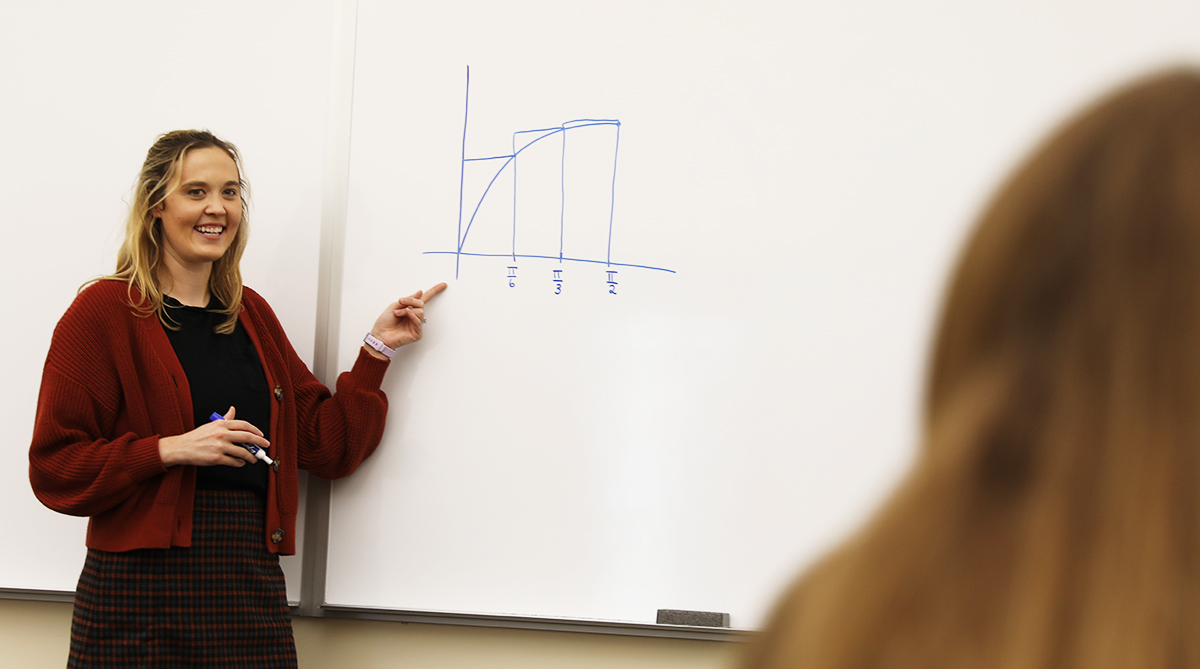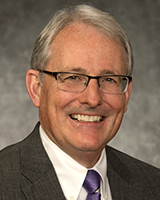Bachelor of Science in Mathematics
Tackle problems – real and mathematical – with a Bachelor of Science in mathematics degree from Mount Union. Whether honing your skills in the classroom to become an educator or pairing your degree with fields like engineering, our program provides the tools you need to be the industrious leader employers are seeking.
Our expert faculty prepare you to be an open-minded critical thinker through conferences and internships that will allow you to apply in-class concepts while interacting with other young mathematicians. Expanding your network while gaining real-world experience, you will leave Mount Union ready to take control of your path.
About the Program
The mathematics major at Mount Union challenges you to face everyday problems with a calm and determined mindset. Through our CAEP-accredited Teacher Education Program, future math educators will enter the field as experienced secondary or middle school mathematics teachers.
You will gain leadership skills through student-led organizations like the Pi Mu Epsilon Mathematics Honorary Society. The experiences you will embark on through our program will help you stand out in the job market.
Mathematics Program Quick Facts
- 46 hours taken directly in the mathematics degree program
- Expand your knowledge through the Integrative Core (IC)
- Interact with peers at conferences or in our unique math learning center.
- Build your network through internships or student employment
Learn more about the Degree in Mathematics
Challenge yourself with numerical theories while changing the way others analyze daily problems with the Bachelor of Science degree in mathematics. Guided by faculty with years of experience, you will reach your full potential and enter your desired career soon after graduation.
-
Curriculum
As a mathematics major at the University of Mount Union, you will take in-depth courses in calculus, statistics, differential equations and number theory. From the basics of algebra to econometrics, you will develop the ability to think critically and use mathematical reasoning in everyday life. As part of our mathematics major requirements and curriculum, you will solve problems, engage in research and benefit from opportunities to present your work, all while learning the skills necessary for success in a number of career fields.
Students may also pursue a teaching career by enrolling in our CAEP accredited Teacher Education Program for mathematics. As part of our program requirements and curriculum, students will spend time working in local secondary and middle school mathematics classes in order to gain hands-on experience in the field of mathematics teaching.
LEARNING OBJECTIVES
- Students will demonstrate their knowledge of key theories, concepts, and methods of inquiry in mathematics.
- Students will demonstrate their ability to solve problems in mathematics using appropriate technology, translating problems from one form to another, using various problem-solving strategies.
- Students will demonstrate their ability to think critically about mathematics by applying key theories, concepts, and methods of inquiry in mathematics to novel problems, to other disciplines, and to situations that require understanding rather than rote memory.
- Students will demonstrate the ability to effectively communicate mathematics orally and in writing.
-
Experiential Learning
Students who choose to major in mathematics at the University of Mount Union will have endless opportunities to get “real-world” experience outside of the classroom. By getting involved in experiential learning opportunities, you can strengthen your skills and knowledge of mathematics, both of which are critical to a successful career in any mathematics field. These hands-on learning opportunities include:
- Internships
- Problem-solving seminars
- Math game nights
- Math competitions
- Mathematics and statistics conferences
- Research with faculty or student peers
- Independent research
ACTIVITIES AND ORGANIZATIONS
Pi Mu Epsilon is a non-secret organization whose purpose is the promotion of scholarly activity in mathematics among students in academic institutions, and among the staffs of qualified non-academic institutions.
The William Lowell Putnam Mathematical Competition is held on the first Saturday in December simultaneously in colleges and universities all over the United States and Canada.
Mathematics Awareness Week is celebrated in April of each year. Throughout the week, various events and activities are put on to promote and celebrate mathematics.
PROFESSIONAL ASSOCIATIONS
-
Student Resources
At the University of Mount Union, we want all of our students to achieve success and be exceptional. To help students reach these goals, the University and its various departments provide students with a number of resources and ways to get the support they need. Here are a few student resources that are specific to the Department of Mathematics and Computer Science and to students pursuing a mathematics major:
- Advanced Placement Credit Breakdown
- Mount Union Mathematics Placement Exam
-
Mathematics Learning Center
The Mathematics Learning Center (MLC) located in KHIC is where students can go to get support or tutoring for their math courses. The center will be open to students starting on the second week of the semester Sunday-Thursday and is staffed by Mathematics Lab Coordinator, Doug Henry. Staff is made up of student tutors who have completed previous math courses and come with recommendations from their professors.
Rather than scheduling specific course tutoring, the MLC is welcome to all math questions on a walk-in basis as well as appointment opportunities with the coordinator. Email mlc@mountunion.edu for questions or potential daytime appointments. Same-day appointments online may not be available, so be sure to schedule at least one day in advance.




